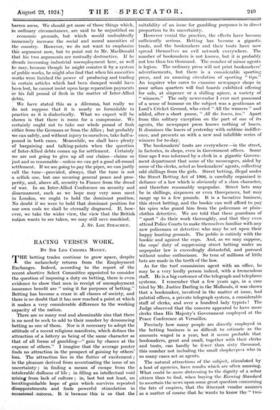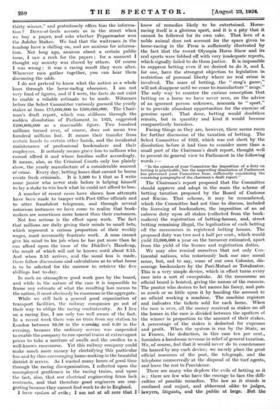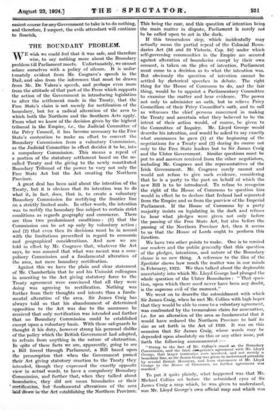rr HE betting trades continue to grow apace, despite the melancholy
returns from the Employment Exchanges. Indeed, according to the report of the recent abortive Select Committee appointed to consider the question of imposing a duty on betting, there is even evidence to show that men in receipt of unemployment insurance benefit are " using it for purposes of betting." Betting has become a craze in all classes of society, and there is no doubt that it has now reached a point at which it makes a very considerable difference to the working capacity of the nation.
There are so many real and abominable sins that there is no need to seek to add to their number by denouncing betting as one of them. Nor is it necessary to adopt the attitude of a recent religious manifesto, which defines the attraction of a lottery as being of the same character as that of all forms of gambling—" gain by chance at the expense of others." I imagine -that the average punter finds no attraction in- the prospect of gaining by others' lois. The "attraction lies in the flutter of excitement ; in the pleasure deriVed from accentuating the issue of an uncertainty ; in finding a means of escape from the intolerable dullness of life ; in filling an intellectual void arising 'from lack of culture ;- in, last but not least, an inextinguishable hope of gain which survives repeated disappointments and finds powerful stimulation in occasional - suecess, It is" because this is " so that the suitability of an issue for gambling purposes is in direct proportion to its uncertainty. However venial the practice, the effects have become sufficiently serious. Betting has become a gigantic trade, and the bookmakers and their touts have now spread themselves an evil network everywhere. The number of bookmakers is not known, but it is probably hot less than ten thousand. The number of minor agents is legion. The ordinary press will not print bookmakers' advertiSennents, but there is a considerable sporting press, and an amazing circulation of sporting " tips." An inquirer who cares to examine newspaper shops- in poor urban quarters will find 'boards exhibited offering for sale, at sixpence or a shilling apiece, a variety' of " winners." The only newsvendor I ever met possessed of a sense of humour on the subject was a gentleman. at Lord's Cricket Ground, who cried " All the winners " and added, after a short pause, " Jill the losers, too.'! Apart from this solitary exception on the part of one of its agents, the newspaper press knows nothing of losers. It dismisses the losers of yesterday with sublime indiffer- ence, and presents us with a new and infallible series of winners for to-day.
The bookmakers' touts are everywhere—in the street, in factories, in shops, even in Government offices. Some time ago I was informed by a clerk in a gigantic Govern- ment department that some of the messengers, aided by some of the clerks, acted as bookmakers' agents, collecting odd shillings from the girls. Street betting, illegal undet the Street Betting Act of 1906, is carefully organized in defiance of a law which is obviously of 'a class character, and therefore reasonably unpopular. Street bets may be in shillings, sixpences or even threepences, but may range up to a few pounds. It is a lucrative business, this street betting, and the bookie can well afford to pay his spies who guard him from the policeman or plain- clothes detective. We are told that these guardians of " sport " do their work thoroughly, and that they even attend Police Courts to make themselves familiar with any new policeman or detective who may be set upon their happy hunting grounds. The public is entirely with the bookie and against the cops. And, as we may suppose, the cops' duty of suppressing street betting under an unpopular law is exceedingly diStasteful, and pursued without undue enthusiasM. So tens of millions of little bets are made in the teeth "of the law.
As for the turf commission agent with an office, he may be a very lordly person indeed, with a tremendous staff. He is a big customer of the telegraph and telephone systems. I remember that a few years ago; in a case tried by Mr. Justice Darling in the Midlands, it was shown that a bookmaker, involved in the matter at issue, had palatial offices, a private telegraph system, a considerable staff of clerks, and over a hundred lady typists ! The Judge observed that the concern appeared to have more clerks than His Majesty's Government employed at the Peace Conference at Versailles.
Precisely how many people are directly employed in the betting business is as difficult to estimate as the amounts waged in a year, but it seems probable that bookmakers, great and small, together with their clerks and touts, can hardly be fewer . than sixty thousand, this -number not including the small shopkeepers who in so many cases act as agents.
The -natural attractions of the subject, stimulated by a host of agencies, have results which are often amusing. What could be more distressing to the dignity of a sober citizen than to find, when buying the Evening Standard to ascertain the news upon some great question concerning the fate of empires, that the itinerant vendor assumes as a matter -of Course that he 'Wants to 'know the." tisid- thirty winner," and gratuitously offers him the informa- tion ? Down-at-heels accosts us in the street whelk we buy a paper, and asks whether Peppercastor won the Jubilee Stakes. We find that the waitresses in the teashop have a shilling on, and are anxious for informa- tion. Not long ago, anxious about a certain public issue, I saw a rush for the papers ; for a moment I thought my anxiety was shared by others. Of course I was wrong ; it was a racing result they were after. Wherever men gather together, you can hear them discussing the odds.
I do not pretend to know what the nation as a whole loses through the horse-racing obsession. I am not very fond of figures, and if I were, the facts do not exist to enable a reliable estimate to be made. Witnesses before the Select Committee variously guessed the yearly stakes at from £75,000,000 to £500,000,000. The Chair- man's draft report, which was stillborn through the sudden dissolution of Parliament in 1923, suggested £200,000,000 as a reasonable figure. Two hundred millions turned over, of course, does not mean two hundred millions lost. It means their transfer from certain hands to certain other hand, and the incidental maintenance of professional bookmakers and their employees. It -certainly means grave loss to millions who cannot afford it and whose families suffer accordingly. It means, also, as the Criminal Courts only too plainly show, the yearly manufacture of a considerable amount of crime. Every day, betting losses that cannot be borne create fresh criminals. It is 1,000 to 1 that as I write some junior who never stole before is helping himself to lay a stake to win back what he could not afford to lose.
A number of recent cases have shown how attempts have •been made to tamper with Post Office officials and to utter fraudulent telegrams, and through several notorious instances we have come to realize that book- makers are sometimes more honest than their customers.
Not less serious is the effect upon work. The fact that millions are daily giving their minds to small bets, which represent a serious proportion of their weekly wages, must necessarily frustrate work. A man cannot give his mind to his job when he has put more than he can afford upon the issue of the Diddler's Handicap, the result of which will not be known until about 3.15. And when 3.15 arrives, and the usual loss is made, there follow discussions and calculations as to what horse is to be selected for the morrow to retrieve the five shillings lost to-day.
In such an atmospkere good work goes by the board, and while in the nature of the case it is impossible to frame any estimate of what the resulting loss means to the nation, it must obviously be enormous in the aggregate.
While we still lack a general good organization of transport facilities, the railway companies go out of their way to oblige the racing confraternity. As I live on a racing line, I am only too well aware of the fact. In a recent week there was no train from my station to London between 16.30 in the morning and 6.30 in the evening, because the ordinary service was suspended to enable the company to run special trains at extravagant prices to take a mixture of swells and the swollen to a well-known racecourse. Yet this railway company could make -much more money by electrifying this particular line and by thus encouraging home-making-in the beautiful district it serves. As I -wasted many hours of good time through the racing disorganization, I reflected upon the unemployed gentlemen in the racing trains, and upon the fact, also, that our electrical engineering firms lack contracts, and- that therefore good engineers are emi- grating because they cannot find work to do in England.
I have spoken of evils ; I am not at all sure that I know of remedies likely to be entertained. Horse- racing itself is a glorious sport, and it is a pity that it cannot be followed for its own sake. That love of a noble animal does not account for the space given to horse-racing in the Press is sufficiently illustrated by the fact that the recent Olympia Horse Show and its real sports were fobbed off with very inadequate reports, which signally failed to do them justice. It is impossible to suppress betting even if we desired to do it, and I, for one, have the strongest objection to legislation in restriction of personal liberty where no real crime is involved. The mass of betting, the " mug's game," will not disappear until we cease to manufacture " mugs." The only way to counter the curious conception that betting on a horse we have never seen, on the advice of an ignorant person unknown, amounts to " sport," is to provide abundant opportunities for the exercise of genuine sport. That done, betting would doubtless remain, but in quantity and kind it would become comparatively harmless.
Facing things as they are, however, there seems room for further discussion of the taxation of betting. The Select Committee of 1923, which was cut short by the dissolution before it had time to consider more than a small part of the Chairman's draft report, thought well to present its general view to Parliament in the following words :— 44 In the opinion .of your Committee the imposition of :a .duty on betting is practicable, but the impending dissolution of Parliament has prevented your Committee from sufficiently considering the remaining paragraphs of the chairman's draft report."
The Chairman's report proposed that the Committee should approve and adopt in the •main the scheme of betting taxation proposed by the Board of Customs and Excise. That scheme, it may be remembered, which the Committee had not time to discuss, -included the licensing of bookmakers, the imposition of an ad valorem duty upon all stakes (collected from the book- makers) the registration of betting-houses, and, street betting remaining illegal, the legalization of cash betting off the racecourses in registered betting houses. The proposed duty was two and a half per cent., which would yield £5,000,000 a year on the turnover estimated, apart from the yield of the licence and registration duties.
We may also remind ourselves that not only Con- tinental nations, who notoriously lack our nice moral sense, but, sad to say, some of our own Colonies, dis- courage bookmakers by the Pari-Mutuel or Totalizator. This is a very simple device, which in effect turns every race into .a sort of sweepstake. At the racecourse an official board is hoisted, giving the names of the runners. The punter who desires to bet names his fancy, and puts so .much or so little upon it by handing the amount to an official working a machine. The machine registers and indicates_ the tickets sold for each horse. When the race is over, all the money received as stakes on all the :horses in the race is divided between the -spotters of the winner in proportion to the amount of their stakes. A percentage of the stakes is deducted for expenses and profit. When the system is run by the State, as in France, the deduction, in this case ten per cent., furnishes a handsome revenue in relief of general taxation. We, of course, feel that it would never do to countenance the hazard by any such device;- we reerely place the great official resources of the post, the telegraph, and the telephone unreservedly at the disposal of the turf :agents, and leave the rest to Providence.
There are many who deplore the evils of betting as it is ; there are few who have the courage to face the diffi- culties of possible remedies. The law as it stands is confused and unjust, and abhorrent alike to judges, lawyers, litigants, and the public at large. But the easiest course for any Government to take is to do nothing, and therefore, I suspect, the evils attendant will continue to flourish.




































 Previous page
Previous page